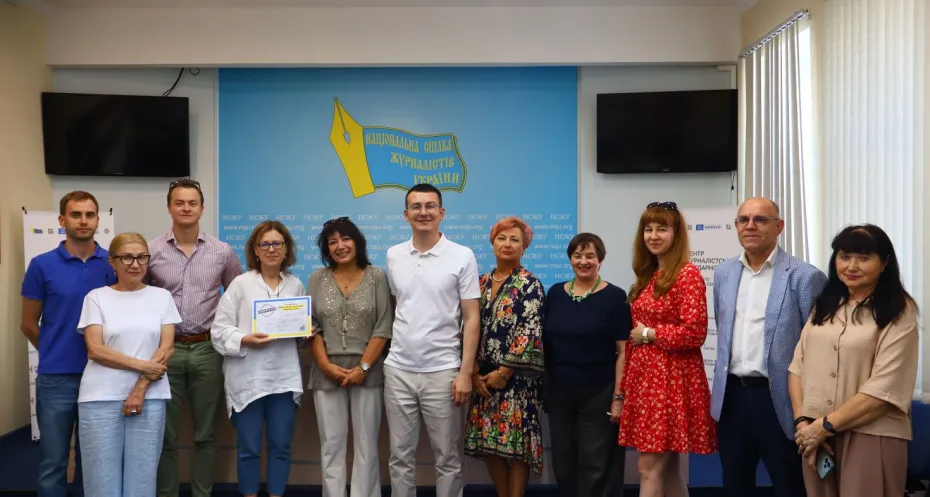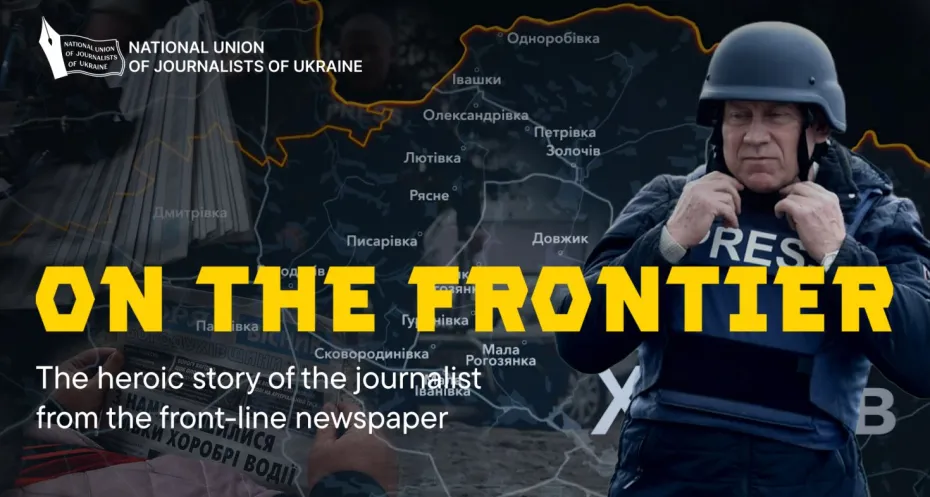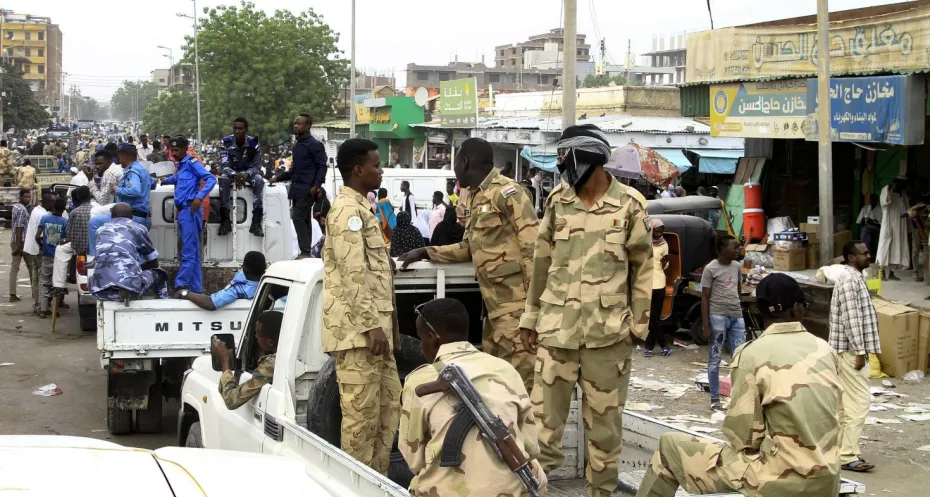Blog Ruth Kronenburg: a moving visit to our media hub for Ukrainian journalists
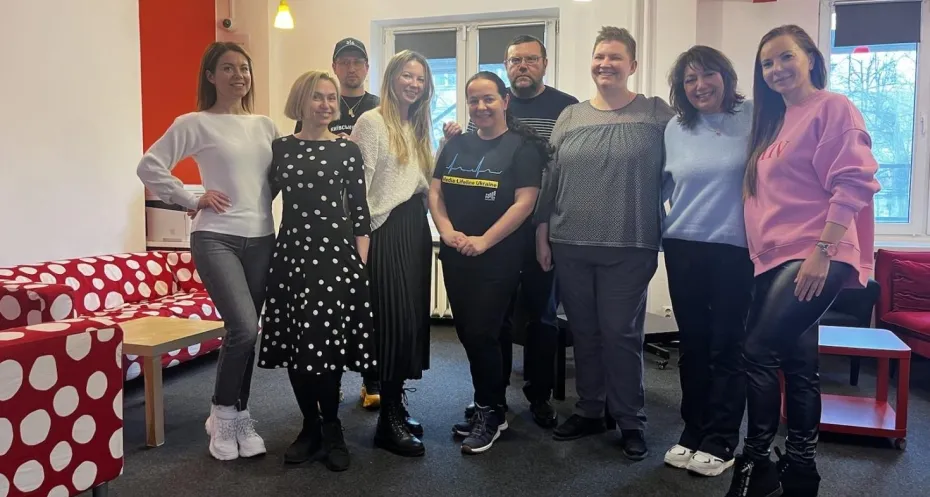
Executive director Ruth Kronenburg visited Free Press Unlimited’s media hub in Warsaw, Poland on 5 April 2023. Here she met the Ukrainian journalists who have been given a safe space so that they can continue their work and provide people in and around Ukraine with reliable information. Read here her blog about the visit.
When the Russian invasion of Ukraine started just over a year ago, we at Free Press Unlimited began almost immediately with the launch of the Media Lifeline Ukraine campaign. A campaign to make sure that independent, relevant and reliable information remains available, even at times of war (or maybe, especially when there is a war). The campaign attracted considerable support, around 30 organisations and a huge number of individuals wanted to work with us. And in just three months we had raised about 1.3 million euros. An unprecedented result for us.
We began providing emergency help immediately. In the beginning we thought that this would just be a temporary situation, something that was needed for the first few months. Now, a year later, we are still getting requests for emergency aid. Bulletproof vests and VPN codes for secure communications are still needed, but also generators because of regular electricity outages. But in fact, we were already thinking of needs in the longer term. If the invasion was to last longer than six months, maybe we needed to think about other forms of support.
"As it is, the media that are still operating in Ukraine are mainly run by women. Mothers who also have to look after their family and relatives."
We thought about setting up a media hub in a neighbouring country to which Ukrainian journalists could escape. We thought about looking for alternatives to get around possible internet shutdowns. And this is what we continue to be busy with today, together with the Ukrainian media who are still doing their jobs from within the country itself. After all, they are in a better position to know what is needed, so that we can respond to that.
Impact of the war
As I write this blog, the number of journalists killed in Ukraine during the war stands at 49. Nine of these were killed while doing their job. Shocking numbers. Most of the journalists were killed while fighting for their country, not as journalists but as soldiers, as freedom fighters. Nevertheless we include them in the figures. Because it means that Ukraine has to do without these journalists. As it is, the media that are still operating in Ukraine are mainly run by women. Mothers who also have to look after their family and relatives. There are hardly any technicians left to sort out technical problems, everyone who can make a contribution in the war against Russia has been called up. And so it is left to the women to keep the media going.
This is the same in the neighbouring countries. Around 80% of all the Ukrainians that have fled are now in bordering countries, the majority in Poland. Poland does not seem to make it difficult for refugees to come into the country and get residency and work permits. As a result, Ukrainians can rebuild their lives relatively easily in Poland. But it remains a foreign country, where they as refugees speak a different language and are far away from their loved ones.
We began recruiting journalists for the media hub after the summer. We thought that by then most of the Ukrainians who had fled to Poland would be more or less settled in, the children in school and homes found. This would be a good moment to find the right journalists to get a stipend from our media hub. This allowance can be compared to a grant: you get money, training and other help (for example psycho-social help), a laptop, a place in which to work and share your experiences. In return, you must be available to work for the media in Ukraine for at least six months.
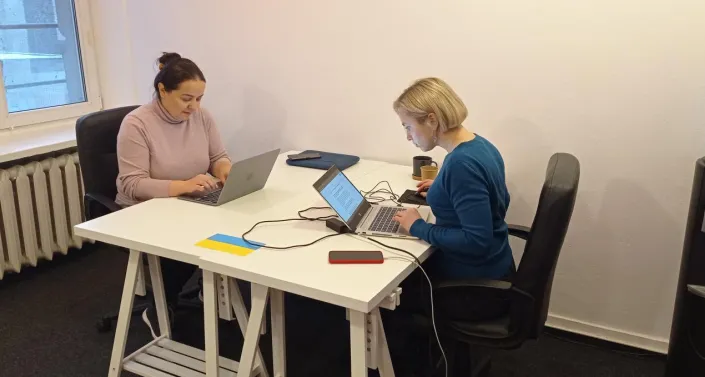
And the location is safe. If you don’t know it’s there, it is almost impossible to find it, even if you are standing right in front of the door. Nothing indicates that this location houses a media hub for journalists who have fled Belarus and Ukraine.
Another benefit is that the head of the Belarussian centre is Polish and knows his way around the Polish media landscape. He also has experience in working with people who are traumatised. Together with our programme coordinator, he carried out the recruitment process. Of the 23 journalists that we initially approached, six were selected and have received a stipend. And now finally I had the opportunity to meet and talk to these six women, four months after they joined the media hub.
The women all have a wonderful and kind appearance. Most of them have worked in (national) television, some as reporters and some as 'anchors'. One of the women was proudly wearing our Media Lifeline Ukraine t-shirt. Absolutely wonderful to see.
"But more than the pride they feel for their work, they say that thanks to the media hub, they have become part of another family."
But they are still 'ordinary' women, talking and laughing with each other. You don’t see that they have been through a lot and have had to leave their men behind in the war. But then you hear their stories. They all say that they have found the media hub a unique way to give meaning to their lives. They all experienced the training as very useful (almost all of them had to retrain to be able to make different kinds of reports). Also for later, when the war is over and they can return to their beloved country. And they all said that working for the media in Ukraine is very special and gives them the feeling that they can make a useful contribution from Poland. They are proud of what they do.
But more than the pride they feel for their work, they say that thanks to the media hub, they have become part of another family. People with whom they can share their sadness and suffering because they understand each other. The same goes for the Belarussian journalists who also work at the media hub. They are not alone in this battle. They also see each other outside of work and despite all the sorrow and trauma, they have the feeling that they are doing something that matters and can really help their fellow Ukrainians.
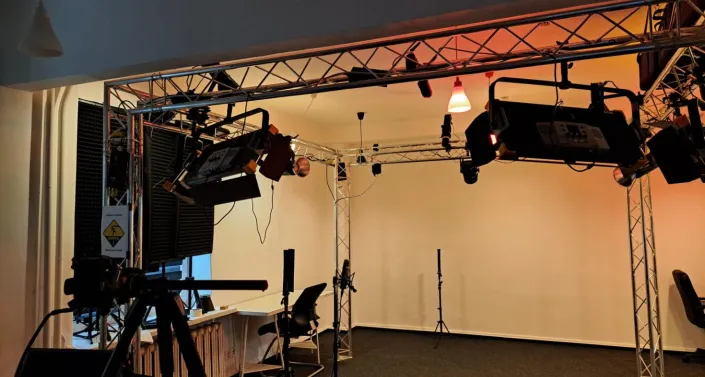
She finally decided to tell her story on camera. She said she had seen how her entire neighbourhood and the city where she had lived her whole life, were destroyed. She had seen everything, including her own flat building, shot and bombed. Nevertheless she refused to move: this was her home and this was where she would stay. Until she was picked up by the Ukrainian army which more or less forced the remaining inhabitants of Mariupol to leave. Then she really had to go, but not without her cat and her ceramic teapot. That is all she has of her old life now.
This story moved all the journalists who worked on it to tears. This woman had lost everything but fought to keep her cat and teapot. Because it was all she had left. Recording her story took over 1.5 hours but the reportage was only supposed to be 30 minutes. With great pain and effort the journalists managed to cut it back and then they broadcast this interview. They received an incredible number of reactions to the interview because so many people could identify with it. As a gesture of support for the women in Ukraine and Poland, you can also watch the interview, with subtitles, below.
Well, what can I say? I am incredibly pleased that I met these women and heard their stories. It once again makes it clear to me why I do this work and with what purpose. These women believe 300% that they will win, because losing is not an option, and that they will be back home soon.
I hope this for them with all my heart. And until then I am proud that we were able to set up this media hub and could help these women. Thanks to them, stories about the refugees from Ukraine are being told and the media in Ukraine have extra staff to provide urgently needed information to their public.
